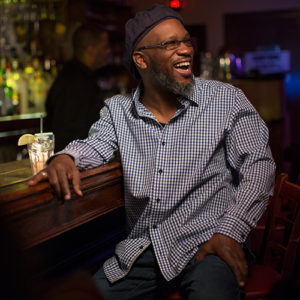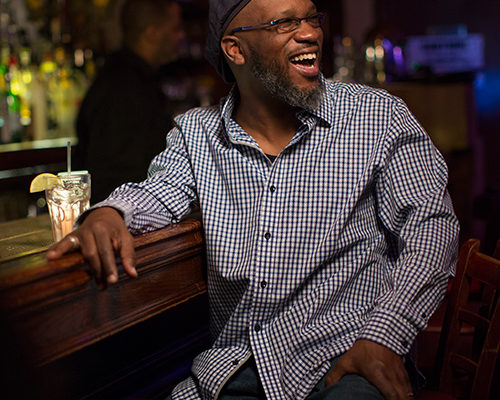BIOGRAPHY
 In the booklet notes for Orrin Evans’ second album, Captain Black, recorded in 1998, the pianist, then 23, made a remark that encapsulates the aesthetic he’s followed ever since on his kaleidoscopic artistic journey. “I go head-first for a lot of things,” Evans said. “I like to stretch out. Wherever the music takes me, I’m going there.”
In the booklet notes for Orrin Evans’ second album, Captain Black, recorded in 1998, the pianist, then 23, made a remark that encapsulates the aesthetic he’s followed ever since on his kaleidoscopic artistic journey. “I go head-first for a lot of things,” Evans said. “I like to stretch out. Wherever the music takes me, I’m going there.”
That attitude backdrops the title of Evans’ 20th album, Magic of Now (Smoke Sessions), which documents a livestream engagement at Smoke Jazz Club during the second weekend of December 2020. Evans and a multi-generational cohort of A-list partners – first-call New York bassist Vicente Archer; iconic drummer Bill Stewart; and dynamic rising star alto saxophonist Immanuel Wilkins, now 23 himself – generate an eight-piece program that exemplifies state-of-the-art modern jazz. From the first note to the last, the quartet, convening as a unit for the first time, displays the cohesion and creative confidence of old friends, mirroring the leader’s predisposition for finding beauty in the heat of the moment.
As he does on five prior albums for Smoke Sessions, eight self-issued albums on Imani Records (his imprint), and earlier recordings for Criss Cross, Palmetto and Posi-Tone, Evans guides the creative flow from the piano, showcasing his authoritative mastery of his instrument and deep assimilation of the fundamentals. A deft tune deconstructor, he traverses a broad timeline of the vocabularies of swinging, blues-infused hardcore jazz and spiritual jazz/avant garde jazz traditions, as well as the Euro-canon, with the intuitive spontaneity of an ear player. He projects an instantly recognizable sound, sometimes eliciting flowing rubato poetry, sometimes evoking the notion that the piano comprises 88 tuned drums. It’s taken a while, but the jazz gatekeepers have noticed – in 2018, Evans topped the “Rising Star Pianist” category in DownBeat Critics Poll, and a feature article about him appears in DownBeat’s September 2021 edition.
Evans’ stylistically polyglot compositions – influenced by the expansive, individuality-first Black Music culture of his native Philadelphia and by a decade playing Charles Mingus’ beyond-category music in the Mingus Big Band – similarly postulate an environment of “structured freedom” that instigates the personnel to push the envelope in all his multifarious leader and collaborative projects.
In none of Evans’ units of recent years is that no-holds-barred attitude more prevalent than the Captain Black Big Band, a communitarian-oriented ensemble whose fourth and latest album is The Intangible Between (Smoke Sessions), preceded by Presence (Smoke Sessions). Both earned Grammy nominations.
Evans and his wife, Dawn, founded Imani in 2001 as a vehicle for Evans to release leader projects that couldn’t otherwise find a home. The label relaunched in 2018, with the release of albums by saxophonist Caleb Wheeler Curtis and bassist Jonathan Michel.
In creating and operating Imani Records, in organizing bands that navigate streams of expression outside his wheelhouse, in booking venues from the Philadelphia room Blue Moon (where he ran a Monday jam session from his late teens until early twenties) to the D.C. Jazz Festival (which recently appointed him Artist in Residence), Evans drew inspiration from his parents. His father, Donald Evans, was a playwright and educator who self-produced his plays; his mother, Frances, an opera singer who put on concerts in various alternative venues.
In addition to teaching on the bandstand, Evans has conveyed knowledge in more formal contexts. For a full year, he curated weekly jazz curriculum in Philadelphia public schools, sponsored by the Kimmel Center for the Performing Arts’ Jazz Standards programming division. For three years he instructed high school students at Germantown Friends School. He’s served on the faculty of Connecticut’s Litchfield Jazz Camp since 2013 (one student was the phenomenal 15-year-old pianist Brandon Goldberg) and the Kimmel Center Jazz Camp, headed by bassist/producer Anthony Tidd (where Evans taught Immanuel Wilkins).
“I’m learning every day,” Evans says. “If someone calls to ask if I have a Brazilian project, I won’t say no. I’ll dive into it, call some great Brazilian musicians and put together a Brazilian project. If someone asks if I have a big band, I’ll educate myself and try to put a big band together. I don’t know how to sit and wait.”

